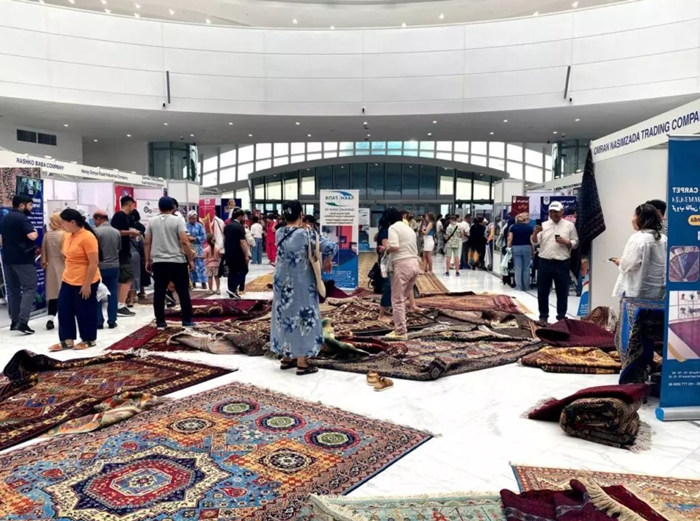nCa Analysis
An Afghan delegation, led by the Taliban acting minister of Industry and Commerce, Nooruddin Azizi, recently visited Kazakhstan.
The 350-strong delegation of Afghanistan participated in the business forum, showcased its products and services, and had numerous meetings. The outcome was the signing of business agreements worth about USD 200 million. — It was a huge success.
This exercise is easily replicable and therein lies the strong possibility to salvage Afghanistan. Let’s call it ‘Kazakh model for Afghanistan.’
Here are the main components of the Kazakh model:
- Kazakhstan has allowed the Taliban ambassador to start working in Astana without touching the question of the recognition of the sitting regime. This is the mechanism adopted by many other countries also. The underlying rationale is that while the recognition or otherwise of a government is supposed to be a collective decision of the world community, the people of Afghanistan have the fundamental right to be recognized. In establishing working relationship with the Taliban, Kazakhstan has actually recognized the people of Afghanistan, and the dire need to uplift them urgently.
- Kazakhstan has clarified that business contacts and relations are a bilateral matter, and there is no legal barrier against them.
- Kazakhstan is a major supplier of essential food products to Afghanistan. According to the press service of the Ministry of Trade of the Republic of Kazakhstan, over the past year, the volume of deliveries of Kazakh flour to Afghanistan increased by 52% (from 895,126 thsd tonnes in 2021 to 1.3 mln tonnes in 2022), wheat – by 20% (from 571.704 thsd tonnes in 2021 to 686.729 thsd tonnes in 2022), sunflower oil – by 6.2 times (from 2.825 thsd tonnes in 2021 to 17.576 thsd tonnes in 2022), and began exporting rye. Kazakhstan also supplies flaxseeds to Afghanistan. —– By keeping the Afghan supplied with the food products, Kazakhstan is helping avert a humanitarian crisis.
- During the visit, the Afghan side displayed more than 400 of their products. Of these, about 80% of the carpets they brought with them were sold at the spot to the visiting public of Kazakhstan. Moreover, agreements were signed for the supply of handmade carpets to Kazakhstan on regular basis. — This provided not only the immediate benefit to the Afghan side but also ensured the livelihood of large number of carpet weavers in Afghanistan because it is a labour-intensive industry.
- There is also an aspect of the human psychology that is unspoken but fully understood. —– If the Taliban have beneficial economic interaction with someone, they will be careful not to lose it. It will create some slight leverage when negotiating with the Taliban. On the other hand, if the Taliban feel that they have nothing to lose (such as keeping their legitimate funds frozen for no legally justifiable reason and banning them from international platforms), they might harden their defiant attitude.
- There is another factor that demands to be acknowledged whether we like it or not. —– Till 2021 (during the Karzai and Ghani regimes) the drug economy accounted for nearly 14% of the GDP of Afghanistan. With the return of the Taliban in August 2021, the poppy cultivation has been reduced by about 90%. The ban enforced by the Taliban has nearly totally eradicated poppies in Helmand and Nangahar, two major production areas. Together with this, the Taliban has been remarkably effective in maintaining brisk trade and crucial minerals exports, stabilizing the Afghan economy, significantly reducing corruption in taxes and customs, and generating some $2 billion in yearly revenues—the same as what the Afghanistan did under far more generous international circumstances. In order to keep the world free of drug supplies from Afghanistan, it is imperative to enable the people to find alternate grassroots economic opportunities.
It would be greatly helpful if the countries in the Greater Central Asia and Middle East could come up with their own versions of the Kazakh model for salvaging Afghanistan. In doing so, they would be doing great service not only to the people of Afghanistan but to their own people too.
On a side note, the close observers can note that the length of the baggy trousers of the Taliban has generally increased and the length of their beards has decreased compared to the last time they were in power. And, their children, in large part, go to the English medium schools in addition to attending the traditional madressah. This is a slightly milder version of the Taliban, one with the potential to interact productively with the world.
Instead of hurrying to find ways to topple them (yet again), it would be useful to encourage them to trim some sharp edges of their ideology by interacting economically with them.
There are only two choices before us:
- Either we do everything in our power to crush the Taliban and in doing so we unleash a massive, unstoppable wave of refugees to Europe, flood the markets again with the Afghan narcotics, and condemn the almost entire population to perish painfully.
- Or, we interact cautiously with the Taliban, providing them with increasing opportunities for the means of mass livelihood, alleviating the suffering of the masses. As the economic dependence of the Taliban on the outside world grows, their inclination to revisit some of their hardline interpretations of the religion may also increase proportionally. /// nCa, 8 August 2023 [photo credit – Press.kz]
#Kazakhstan, #Afghanistan, #Taliban
